China Arts & Entertainment
Rock Hotpot: Why Chinese Celebrities are Opening up Their Own Hot Pot Restaurants
It remains one of China’s favorite dining styles: hot pot (火锅), also known as Chinese fondue – a dish that never seems to go out of fashion. Why are so many Chinese celebrities opening up their own hot pot restaurants?
Published
8 years agoon
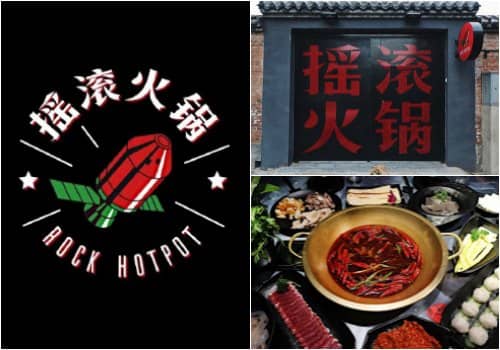
It is one of China’s favorite dining styles: hot pot (火锅), also known as Chinese fondue, an ancient dish that never seems to go out of fashion. In this special series, What’s on Weibo explores the latest trends in the world of Chinese hot pot. In this first issue: our recent visit to Beijing’s Rock Hotpot, owned by the popular Chinese rock band Second Hand Rose. Why is it a trend for Chinese celebrities to open up their own hot pot restaurant? (Check out our latest Weivlog here.)
It is a growing trend that started some years ago: Chinese celebrities are opening up their own hot pot restaurants across the country. Over the past few months, the celebrity hot pot boom has caught the attention of Chinese media sites and Weibo’s netizens, making ‘celebrity hotpot’ (明星火锅店) a much talked-about topic.
Alternative Beijing rock band Second Hand Rose (二手玫瑰) recently opened up its very first private hot pot place in Songzhuang, while the established celebrity hot pot chain ReLaYiHao just keeps getting more popular.
But there are also scandals; Chinese actor Bao Bei’er (包贝尔) was called out by Chinese state media earlier this year for serving fake duck blood in his hot pot joint.

Spicy hotpot served by Second Hand Rose.
Chinese hot pot (huǒguō 火锅, literally: ‘fire pot’) has a history of over 1000 years. The tradition is thought to have derived from Mongol warriors who camped outside and had dinner together, circled around a pot on the fire.
The main idea is that while the hot pot brew is kept boiling, you place fresh ingredients into the pot and cook them at the table. Nowadays, hot pot tastes vary greatly across different regions in China, but what matters most is its enjoyment: sitting with friends and family around the boiling stew, sharing food, eating slowly, and talking.
Celebrity Hot Pots
Over the past five years, it has become a trend for Chinese stars to invest in hot pot chains or start their own restaurants. As early as 2009, Taiwanese singer and actor Nicky Wu (吴奇隆) was one of the early adopters when he started a Thai-style hot pot chain by the name of Lemon Leaf (柠檬叶子). He now has three restaurants in Taiwan, and one in Beijing.
Many other celebrities followed over the past three or four years. Since September 2016, Chinese actor Ren Quan (任泉) started the hotpot chain ReLaYiHao (热辣壹号) together with fellow celebrities Li Bingbing (李冰冰) and Huang Xiaoming (黄晓明). The chain now has branches from Beijing to Nanjing, and, according to the latest media reports, is fully packed every night.
Popular Chinese actress Deng Jiajia (邓家佳), born in Sichuan, also opened up her own ‘HI hotpot’ (HI辣火锅) in Beijing last year. Celebrities Eric Tsang (曾志伟), Chyi Chin (齐秦), Xu Zhiqian (薛之谦), and many others, have all opened up their own hot pot restaurants since 2013.

Ren Quan, Li Bingbing, and Huang Xiaoming: the famous investors behind the “Re La Yi Hao” hotpot chain.
The reason China’s celebrities love the concept of hot pot is simple. With a fanbase of millions, Chinese celebrities use their fame and influence to bring business to their restaurants. Chinese actor and entrepreneur Ren Quan, for example, has a staggering 11,5 million fans on his Weibo page – the perfect place to promote his latest hot pot branch.
The threshold for opening up a hot pot eatery is also low because it does not require as much professional knowledge as needed for other types of restaurants; for hot pot, a restaurant basically has to serve its customers a proper broth and the right ingredients. There is no need to hire high-end restaurant chefs. Hot pot restaurants are relatively easy to manage and need far fewer investment costs than many other types of restaurants.
Besides the fact that they are easy to set up and manage, there are other reasons why so many Chinese celebrities are choosing for this type of restaurant. It is a dining style that is suitable for all audiences, young and old, and is popular across China; no matter if you are in Beijing, Sichuan, or China’s coastal areas, there is a strong demand for Chinese fondue and a great freedom in varying between broth flavors and ingredients.
Lastly, the concept of hot pot itself is ideal for duplicating. Since many Chinese celebrities are choosing to start hot pot chains with multiple branches, this genre makes it easy to start the same model in various places. What’s not to love about it?
The Hot Pot Pitfall
As easy as it sounds, stepping into the hot pot business is not all roses for Chinese celebrities. In March of this year, Chinese actor Bao Bei’er (包贝尔) was caught in controversy when journalists exposed that the Harbin branch of his LaZhuang Huoguo (辣庄火锅) served its customers fake duck blood, a popular hot pot ingredient. The branch passed off cheap ox blood as duck blood, which is much more expensive.
Since Bao Bei’er is the face of the restaurant, it was him who became the target of netizens’ anger. The hashtag ‘Bao Bei’ers Restaurant Exposed’ (#包贝尔火锅店被曝#) was viewed more than a million times on Weibo.
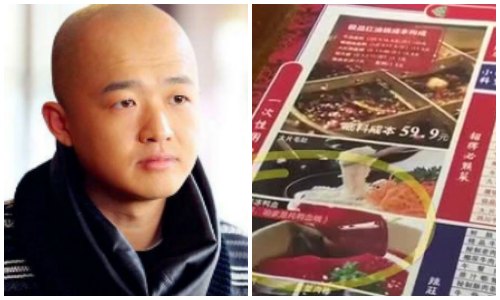
Pricy ox blood sold as ‘duck blood’ in Bao Bei’er’s hotpot restaurant.
Bao Bei’er later publicly apologized to his fans and customers, saying he took full responsibility for mismanaging his restaurants. As easy as setting up a hot pot place might be, it is essential for celebrities to ensure its service and quality. In the end, it is not the restaurant staff but the celebrity name that will be dragged through the mud if anything goes wrong.
Second Hand Rose: Rock Hotpot
Recently, another famous name has been added to the list of celebrity hot pot restaurants. Beijing rock band Second Hand Rose (二手玫瑰) opened its private hot pot diner ‘Rock Hotpot’ (摇滚火锅) in the Songzhuang art district, the biggest artist community in Beijing.
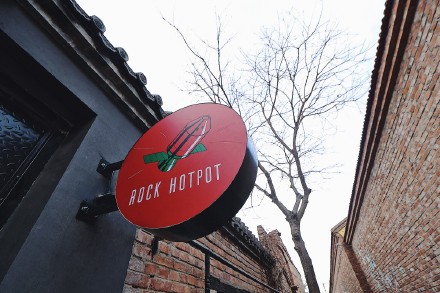
Rock Hotpot in Songzhuang, Beijing.
Lead singer Liang Long (梁龙) is a lover of both rock music and hot pot and initially opened the diner as a trial. Making all broths and sauces from scratch, each member of the band has his own soup base that reflects their personality. Customers can book their private table (there is just one private table available every night), or purchase the ingredients for takeaway hot pot.

Fresh sauces made from scratch at Rock Hotpot.
According to Liang Long, the hot pot restaurant only adds to the image of the band; both hot pot and rock music have the same powerful, quick-boiling “woosh” vibe to it.
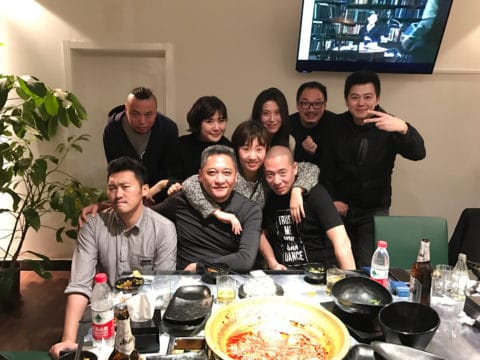
Fans can hang out with their favorite band at Rock Hotpot.
For now, the opening of Rock Hotpot has brought Second Hand Rose nothing but good things, Liang Long told What’s on Weibo. Not only does the band enjoy experimenting with different flavors and ingredients, the restaurant also brings them closer to their fans and friends who head out to Songzhuang for a night of hot pot together.

Private dining space at Second Hand Rose’s Rock Hotpot.
In the near future, Rock Hotpot hopes to open up a bigger restaurant to welcome more fans and food lover to their Rock Hotpot. They won’t be the only Chinese celebrities to do so – having hot pot with your idol is the latest hype in the world of showbiz and Chinese fondue.
Check out our visit to Rock hotpot in this video.
Rock Hotpot Address:
Beijing, Tongzhou District, Songzhuang Town, Xiaoqiao West Street No. 34.
北京宋庄,通州区宋庄镇小堡西街34号.
Reservations / Mr Wang: 13946228228
– By Manya Koetse
Follow @WhatsOnWeibo
©2017 Whatsonweibo. All rights reserved. Do not reproduce our content without permission – you can contact us at info@whatsonweibo.com.
Manya is the founder and editor-in-chief of What's on Weibo, offering independent analysis of social trends, online media, and digital culture in China for over a decade. Subscribe to gain access to content, including the Weibo Watch newsletter, which provides deeper insights into the China trends that matter. More about Manya at manyakoetse.com or follow on X.

China Arts & Entertainment
How K-pop Fans and the 13-Year-Old Daughter of Baidu VP Sparked a Debate on Online Privacy
What began as K-pop fan outrage targeting a snarky commenter quickly escalated into a Baidu-linked scandal and a broader conversation about data privacy on Chinese social media.
Published
1 month agoon
March 26, 2025By
Ruixin Zhang
For an ordinary person with just a few followers, a Weibo account can sometimes be like a refuge from real life—almost like a private space on a public platform—where, along with millions of others, they can express dissatisfaction about daily annoyances or vent frustration about personal life situations.
But over recent years, even the most ordinary social media users could become victims of “opening the box” (开盒 kāihé)—the Chinese internet term for doxxing, meaning the deliberate leaking of personal information to expose or harass someone online.
A K-pop Fan-Led Online Witch Hunt
On March 12, a Chinese social media account focusing on K-pop content, Yuanqi Taopu Xuanshou (@元气桃浦选手), posted about Jang Wonyoung, a popular member of the Korean girl group IVE. As the South Korean singer and model attended Paris Fashion Week and then flew back the same day, the account suggested she was on a “crazy schedule.”
In the comment section, one female Weibo user nicknamed “Charihe” replied:
💬 “It’s a 12-hour flight and it’s not like she’s flying the plane herself. Isn’t sleeping in business class considered resting? Who says she can’t rest? What are you actually talking about by calling this a ‘crazy schedule’..”

Although the comment may have come across as a bit snarky, it was generally lighthearted and harmless. Yet unexpectedly, it brought disaster upon her.
That very evening, the woman nicknamed Charihe was bombarded with direct messages filled with insults from fans of Jang Wonyoung and IVE.
Ironically, Charihe’s profile showed she was anything but a hater of the pop star—her Weibo page included multiple posts praising Wonyoung’s beauty and charm. But that context was ignored by overzealous fans, who combed through her social media accounts looking for other posts to criticize, framing her as a terrible person.
After discovering through Charihe’s account that she was pregnant, Jang Wonyoung’s fans escalated their attacks by targeting her unborn child with insults.
The harassment did not stop there. Around midnight, fans doxxed Charihe, exposing her personal information, workplace, and the contact details of her family and friends. Her friends were flooded with messages, and some were even targeted at their workplaces.
Then, they tracked down Charihe’s husband’s WeChat account, sent him screenshots of her posts, and encouraged him to “physically punish” her.
The extremity of the online harassment finally drew backlash from netizens, who expressed concern for this ordinary pregnant woman’s situation:
💬 “Her entire life was exposed to people she never wanted to know about.”
💬 “Suffering this kind of attack during pregnancy is truly an undeserved disaster.”
Despite condemnation of the hate, some extreme self-proclaimed “fans” remained relentless in the online witch hunt against Charihe.
Baidu Takes a Hit After VP’s 13-Year-Old Daughter Is Exposed
One female fan, nicknamed “YourEyes” (@你的眼眸是世界上最小的湖泊), soon started doxxing commenters who had defended her. The speed and efficiency of these attacks left many stunned at just how easy it apparently is to trace social media users and doxx them.
Digging into old Weibo posts from the “YourEyes” account, people found she had repeatedly doxxed people on social media since last year, using various alt accounts.
She had previously also shared information claiming to study in Canada and boasted about her father’s monthly salary of 220,000 RMB (approx. $30.3K), along with a photo of a confirmation document.
Piecing together the clues, online sleuths finally identified her as the daughter of Xie Guangjun (谢广军), Vice President of Baidu.
From an online hate campaign against an innocent, snarky commenter, the case then became a headline in Chinese state media, and even made international headlines, after it was confirmed that the user “YourEyes”—who had been so quick to dig up others’ personal details—was in fact the 13-year-old daughter of Xie Guangjun, vice president at one of China’s biggest tech giants.
On March 17, Xie Guangjun posted the following apology to his WeChat Moments:

💬 “Recently, my 13-year-old daughter got into an online dispute. Losing control of her emotions, she published other people’s private information from overseas social platforms onto her own account. This led to her own personal information also getting exposed, triggering widespread negative discussion.
As her father, I failed to detect the problem in time and failed to guide her in how to properly handle the situation. I did not teach her the importance of respecting and protecting the privacy of others and of herself, for which I feel deep regret.
In response to this incident, I have communicated with my daughter and sternly criticized her actions. I hereby sincerely apologize to all friends affected.
As a minor, my daughter’s emotional and cognitive maturity is still developing. In a moment of impulsiveness, she made a wrong decision that hurt others and, at the same time, found herself caught in a storm of controversy that has subjected her to pressure and distress far beyond her age.
Here, I respectfully ask everyone to stop spreading related content and to give her the opportunity to correct her mistakes and grow.
Once again, I extend my apologies, and I sincerely thank everyone for your understanding and kindness.”
The public response to Xie’s apology has been largely negative. Many criticized the fact that it was posted privately on WeChat Moments rather than shared on a public platform like Weibo. Some dismissed the statement as an attempt to pacify Baidu shareholders and colleagues rather than take real accountability.
Netizens also pointed out that the apology avoided addressing the core issue of doxxing. Concerns were raised about whether Xie’s position at Baidu—and potential access to sensitive information—may have helped his daughter acquire the data she used to doxx others.
Adding fuel to the speculation were past conversations allegedly involving one of @YourEyes’ alt accounts. In one exchange, when asked “Who are you doxxing next?” she replied, “My parents provided the info,” with a friend adding, “The Baidu database can doxx your entire family.”
Following an internal investigation, Baidu’s head of security, Chen Yang (陈洋), stated on the company’s internal forum that Xie Guangjun’s daughter did not obtain data from Baidu but from “overseas sources.”
However, this clarification did little to reassure the public—and Baidu’s reputation has taken a hit. The company has faced prior scandals, most notably a the 2016 controversy over profiting from misleading medical advertisements.
Online Vulnerability
Beyond Baidu’s involvement, the incident reignited wider concerns about online privacy in China. “Even if it didn’t come from Baidu,” one user wrote, “the fact that a 13-year-old can access such personal information about strangers is terrifying.”
Using the hashtag “Reporter buys own confidential data” (#记者买到了自己的秘密#), Chinese media outlet Southern Metropolis Daily (@南方都市报) recently reported that China’s gray market for personal data has grown significantly. For just 300 RMB ($41), their journalist was able to purchase their own household registration data.
Further investigation uncovered underground networks that claim to cooperate with police, offering a “70-30 profit split” on data transactions.
These illegal data practices are not just connected to doxxing but also to widespread online fraud.
In response, some netizens have begun sharing guides on how to protect oneself from doxxing. For example, they recommend people disable phone number search on apps like WeChat and Alipay, hide their real name in settings, and avoid adding strangers, especially if they are active in fan communities.
Amid the chaos, K-pop fan wars continue to rage online. But some voices—such as influencer Jingzai (@一个特别虚荣的人)—have pointed out that the real issue isn’t fandom, but the deeper problem of data security.
💬 “You should question Baidu, question the telecom giants, question the government, and only then, fight over which fan group started this.”
As for ‘Charihe,’ whose comment sparked it all—her account is now gone. Her username has become a hashtag. For some, it’s still a target for online abuse. For others, it is a reminder of just how vulnerable every user is in a world where digital privacy is far from guaranteed.
By Ruixin Zhang
Independently covering digital China for over a decade. Like what we do? Support us and get the story behind the hashtag by subscribing:
edited for clarity by Manya Koetse
Spotted a mistake or want to add something? Please let us know in comments below or email us. First-time commenters, please be patient – we will have to manually approve your comment before it appears.
©2025 Whatsonweibo. All rights reserved. Do not reproduce our content without permission – you can contact us at info@whatsonweibo.com.
China Memes & Viral
How Ne Zha 2’s Shen Gongbao Became Known as the Ultimate “Small-Town Swot”
Published
2 months agoon
March 1, 2025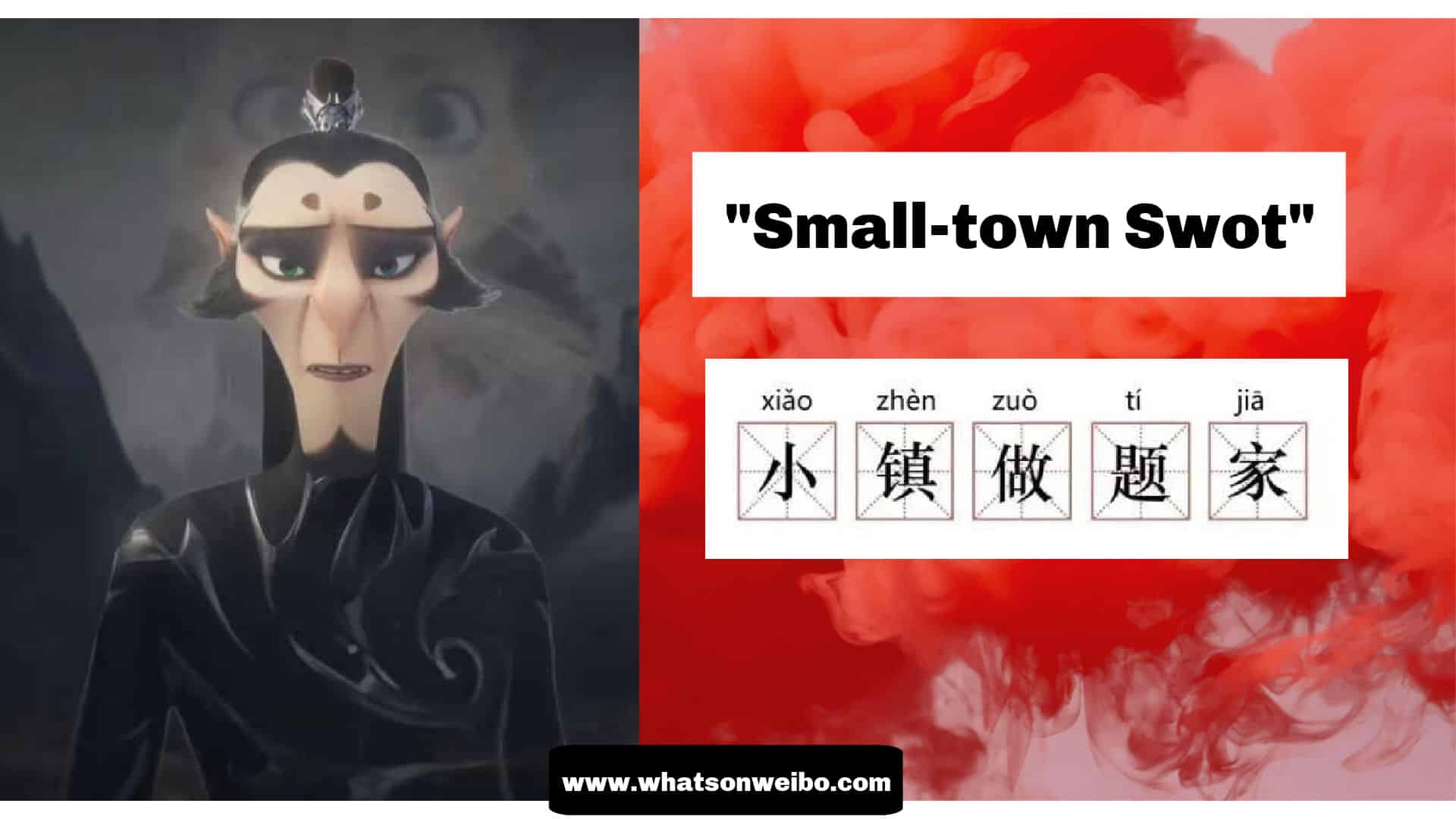
PART OF THIS TEXT COMES FROM THE WEIBO WATCH PREMIUM NEWSLETTER
Over the past few weeks, the Chinese blockbuster Ne Zha 2 has been trending on Weibo every single day. The movie, loosely based on Chinese mythology and the Chinese canonical novel Investiture of the Gods (封神演义), has triggered all kinds of memes and discussions on Chinese social media (read more here and here).
One of the most beloved characters is the leopard demon Shen Gongbao (申公豹). While Shen Gongbao was a more typical villain in the first film, the narrative of Ne Zha 2 adds more nuance and complexity to his character. By exploring his struggles, the film makes him more relatable and sympathetic.
In the movie, Shen is portrayed as a sometimes sinister and tragic villain with humorous and likeable traits. He has a stutter, and a deep desire to earn recognition. Unlike many celestial figures in the film, Shen Gongbao was not born into privilege and never became immortal. As a demon who ascended to the divine court, he remains at the lower rungs of the hierarchy in Chinese mythology. He is a hardworking overachiever who perhaps turned into a villain due to being treated unfairly.
Many viewers resonate with him because, despite his diligence, he will never be like the gods and immortals around him. Many Chinese netizens suggest that Shen Gongbao represents the experience of many “small-town swots” (xiǎozhèn zuòtíjiā 小镇做题家) in China.
“Small-town swot” is a buzzword that has appeared on Chinese social media over the past few years. According to Baike, it first popped up on a Douban forum dedicated to discussing the struggles of students from China’s top universities. Although the term has been part of social media language since 2020, it has recently come back into the spotlight due to Shen Gongbao.
“Small-town swot” refers to students from rural areas and small towns in China who put in immense effort to secure a place at a top university and move to bigger cities. While they may excel academically, even ranking as top scorers, they often find they lack the same social advantages, connections, and networking opportunities as their urban peers.
The idea that they remain at a disadvantage despite working so hard leads to frustration and anxiety—it seems they will never truly escape their background. In a way, it reflects a deeper aspect of China’s rural-urban divide.
Some people on Weibo, like Chinese documentary director and blogger Bianren Guowei (@汴人郭威), try to translate Shen Gongbao’s legendary narrative to a modern Chinese immigrant situation, and imagine that in today’s China, he’d be the guy who trusts in his hard work and intelligence to get into a prestigious school, pass the TOEFL, obtain a green card, and then work in Silicon Valley or on Wall Street. Meanwhile, as a filial son and good brother, he’d save up his “celestial pills” (US dollars) to send home to his family.
Another popular blogger (@痴史) wrote:
“I just finished watching Ne Zha and my wife asked me, why do so many people sympathize with Shen Gongbao? I said, I’ll give you an example to make you understand. Shen Gongbao spent years painstakingly accumulating just six immortal pills (xiāndān 仙丹), while the celestial beings could have 9,000 in their hand just like that.
It’s like saving up money from scatch for years just to buy a gold bracelet, only to realize that the trash bins of the rich people are made of gold, and even the wires in their homes are made of gold. It’s like working tirelessly for years to save up 60,000 yuan ($8230), while someone else can effortlessly pull out 90 million ($12.3 million).In the Heavenly Palace, a single meal costs more than an ordinary person’s lifetime earnings.
Shen Gongbao seems to be his father’s pride, he’s a role model to his little brother, and he’s the hope of his entire village. Yet, despite all his diligence and effort, in the celestial realm, he’s nothing more than a marginal figure. Shen Gongbao is not a villain, he is just the epitome of all of us ordinary people. It is because he represents the state of most of us normal people, that he receives so much empathy.”
In the end, in the eyes of many, Shen Gongbao is the ultimate small-town swot. As a result, he has temporarily become China’s most beloved villain.
By Manya Koetse, with contributions by Wendy Huang
Follow @whatsonweibo
Spotted a mistake or want to add something? Please let us know in comments below or email us. Please note that your comment below will need to be manually approved if you’re a first-time poster here.
©2025 Whatsonweibo. All rights reserved. Do not reproduce our content without permission – you can contact us at info@whatsonweibo.com
Subscribe

China’s Major Food Delivery Showdown: What to Know about the JD.com vs. Meituan Clash

The Liaoyang Restaurant Fire That Killed 22 People

China Is Not Censoring Its Social Media to Please the West

Aftermath of Suzhou Marathon’s “Pissing Gate”

Do You Know Who Li Gang Is? Anti-Corruption Official Arrested for Corruption

Beyond the Box Office: What’s Behind Ne Zha 2’s Success?

IShowSpeed in China: Streaming China’s Stories Well

Tuning Into the Year of the Snake

“Black Myth: Wukong”: From Gaming Screens to the CMG Spring Festival Gala?

Collective Grief Over “Big S”

US-Russia Rapprochement and “Saint Zelensky”: Chinese Online Reactions to Trump’s Shake-Up

Chinese New Nickname for Trump Mixes Fairy Tales with Tariff War

China Reacts: 3 Trending Hashtags Shaping the Tariff War Narrative

The ‘China-chic Girl’ Image and the Realities of China’s Competitive Food Delivery Market

Strange Encounter During IShowSpeed’s Chengdu Livestream
Get in touch
Would you like to become a contributor, or do you have any tips or suggestions? Get in touch here!
Popular Reads
-

 China Insight12 months ago
China Insight12 months agoThe Tragic Story of “Fat Cat”: How a Chinese Gamer’s Suicide Went Viral
-

 China Digital11 months ago
China Digital11 months agoChina’s 2024 Gaokao Triggers Online Discussions on AI
-

 China Arts & Entertainment12 months ago
China Arts & Entertainment12 months agoSinging Competition or Patriotic Fight? Hunan TV’s ‘Singer 2024’ Stirs Nationalistic Sentiments
-

 China Brands, Marketing & Consumers12 months ago
China Brands, Marketing & Consumers12 months agoA Brew of Controversy: Lu Xun and LELECHA’s ‘Smoky’ Oolong Tea







jobs
June 1, 2017 at 11:18 pm
interesting
jobs in china
June 1, 2017 at 11:19 pm
visit https://dbestinfo.com for jobs in china